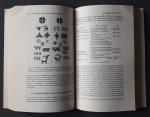Fairservis, Walter A., Jr - The Roots of Ancient India - The Ar
| Schrijver: | Fairservis, Walter A., Jr |
|---|---|
| Titel: | The Roots of Ancient India - The Archaeology of Early Indian Civilization |
| ISBN: | 9780226234298 |
| Taal: | Engels |
| Uitgever: | Chicago : The University of Chicago Press, 1975 |
| Bijzonderheden: | Paperback, 480 pp. Second Edition, Revised. In goede staat |
| Prijs: | € 17,00 |
| Verzendkosten: | € 6,00 (binnen Nederland) |
| Meer info: |
ISBN 0226234290 Hoek wat gekreukt t.g.v een val. Verder prima, vrij van aantekeningen e.d. Rijk geïllustreerd: 60 plates, 28 maps, 75 figures, 10 tables, footnotes & references, general bibliography, index.
Walter Ashlin Fairservis (1921 – 1994) was an American archaeologist. He was born in Brooklyn, New York, United States, in 1921. His mother, Edith Yeager, was an actress. His wife, Jan, was an artist and illustrator. He received B.A. and M.A. degrees in anthropology from Columbia University and a second M.A. and a Ph.D. from Harvard University. Bibliography Some of his notable books are: Before the Buddha Came The Roots of Ancient India Cave Paintings of the Great Hunters The Ancient Kingdoms of the Nile and the Doomed Monuments of Nubia The Archeology of the Southern Gobi-Mongolia The Harappan Civilization and Its Writing: A Model for the Decipherment of the Indus Script The threshold of civilization;: An experiment in prehistory By 55,000 years ago, the first modern humans, or Homo sapiens, had arrived on the Indian subcontinent from Africa, where they had earlier evolved. The earliest known modern human remains in South Asia date to about 30,000 years ago. After 6500 BCE, evidence for domestication of food crops and animals, construction of permanent structures, and storage of agricultural surplus appeared in Mehrgarh and other sites in what is now Balochistan, Pakistan.These gradually developed into the Indus Valley Civilisation, the first urban culture in South Asia, which flourished during 2500–1900 BCE in what is now Pakistan and western India. Centred around cities such as Mohenjo-daro, Harappa, Dholavira, and Kalibangan, and relying on varied forms of subsistence, the civilisation engaged robustly in crafts production and wide-ranging trade. During the period 2000–500 BCE, many regions of the subcontinent transitioned from the Chalcolithic cultures to the Iron Age ones. The Vedas, the oldest scriptures associated with Hinduism, were composed during this period, and historians have analysed these to posit a Vedic culture in the Punjab region and the upper Gangetic Plain. Most historians also consider this period to have encompassed several waves of Indo-Aryan migration into the subcontinent from the north-west. The caste system, which created a hierarchy of priests, warriors, and free peasants, but which excluded indigenous peoples by labelling their occupations impure, arose during this period.[83] On the Deccan Plateau, archaeological evidence from this period suggests the existence of a chiefdom stage of political organisation. In South India, a progression to sedentary life is indicated by the large number of megalithic monuments dating from this period, as well as by nearby traces of agriculture, irrigation tanks, and craft traditions. A map of Ashoka's empire, c. 250 BCE In the late Vedic period, around the 6th century BCE, the small states and chiefdoms of the Ganges Plain and the north-western regions had consolidated into 16 major oligarchies and monarchies that were known as the mahajanapadas.The emerging urbanisation gave rise to non-Vedic religious movements, two of which became independent religions. Jainism came into prominence during the life of its exemplar, Mahavira. Buddhism, based on the teachings of Gautama Buddha, attracted followers from all social classes excepting the middle class; chronicling the life of the Buddha was central to the beginnings of recorded history in India. In an age of increasing urban wealth, both religions held up renunciation as an ideal, and both established long-lasting monastic traditions. Politically, by the 3rd century BCE, the kingdom of Magadha had annexed or reduced other states to emerge as the Mauryan Empire. The empire was once thought to have controlled most of the subcontinent except the far south, but its core regions are now thought to have been separated by large autonomous areas.The Mauryan kings are known as much for their empire-building and determined management of public life as for Ashoka's renunciation of militarism and far-flung advocacy of the Buddhist dhamma. The Sangam literature of the Tamil language reveals that, between 200 BCE and 200 CE, the southern peninsula was ruled by the Cheras, the Cholas, and the Pandyas, dynasties that traded extensively with the Roman Empire and with West and South-East Asia. In North India, Hinduism asserted patriarchal control within the family, leading to increased subordination of women. By the 4th and 5th centuries, the Gupta Empire had created a complex system of administration and taxation in the greater Ganges Plain; this system became a model for later Indian kingdoms. Under the Guptas, a renewed Hinduism based on devotion, rather than the management of ritual, began to assert itself. This renewal was reflected in a flowering of sculpture and architecture, which found patrons among an urban elite. Classical Sanskrit literature flowered as well, and Indian science, astronomy, medicine, and mathematics made significant advances. (Wikipedia) |

Verzendingen vinden plaats na ontvangst van betaling.
De verkoper zal binnen 1 werkdag contact met u opnemen om de koop verder af te handelen.
Het huisnummer is ook opgegeven in het straat veld. Gelieve controleren of de velden straat en huisnummer correct zijn opgegeven.
Straat:
Nummer:
- Alle boeken zijn compleet en verkeren in normale antiquarische staat, tenzij anders beschreven. Kleine onvolkomenheden, zoals een ingeplakte ex-libris of een naam op het schutblad, zijn niet altijd vermeld
- U handelt deze order direct af met Apollonius
Deze verkoper is een particulier, dit heeft invloed op welke rechten voor u als koper ontbreken. Zo heeft u geen herroepingsrecht of conformiteitsrecht. Verder lezen. - Na uw bestelling ontvangen u en Apollonius een bevestiging per e-mail. In de e-mail staan de naam, adres, woonplaats en telefoonnummer van Apollonius vermeld
- De Koper betaalt de verzendkosten, tenzij anders overeen gekomen
- Apollonius kan betaling vooraf vragen
- Boekwinkeltjes.nl probeert Kopers en Verkopers tot elkaar te brengen. Boekwinkeltjes.nl is echter nimmer partij bij een overeenkomst die gesloten wordt tussen Koper en Verkoper door gebruikmaking van de site. Als u een geschil hebt met één of meer gebruikers, dient u dit zelf op te lossen. U vrijwaart Boekwinkeltjes.nl van enigerlei vorderingen, aanspraken op schadevergoeding en dergelijke, verband houdende met dergelijke geschillen.
Onthoud mijn gegevens
Registreer u vrijblijvend als koper!
Besteld, hoe nu verder?
De verkoper zal binnen 1 werkdag contact met u opnemen om de koop verder af te handelen. Afhankelijk van uw locatie heeft u in de meeste gevallen binnen 2 dagen uw bestelling in huis.




